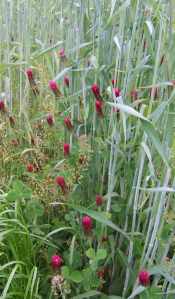 Wazzu: Washington State University is our state’s “land grant” college, which means it was founded on agriculture and continues to be funded for that vein of research and education. Since I’m a WSU alum, I often receive mailings with news on current research being done there. I’ve been impressed with their commitment to study and further the movements of organic farming, crop rotation, bringing back heritage varieties of plants and animals, and other earth-friendly agricultural pursuits. Check out WSU’s Small Farms Team website or news on the WSU Agricultural Research Center.
Wazzu: Washington State University is our state’s “land grant” college, which means it was founded on agriculture and continues to be funded for that vein of research and education. Since I’m a WSU alum, I often receive mailings with news on current research being done there. I’ve been impressed with their commitment to study and further the movements of organic farming, crop rotation, bringing back heritage varieties of plants and animals, and other earth-friendly agricultural pursuits. Check out WSU’s Small Farms Team website or news on the WSU Agricultural Research Center.
Extension: WSU has “outreach” offices in every county in the state, called Cooperative Extension offices, that provide local resources, classes, and experts on livestock and plants, amongst other things. An interesting service they usually offer is bug identification and plant disease ID. The Extension system in my region has long-offered a “Master Gardener” education series, which trades volunteerism for extensive training in horticulture. Modeled after that, we now also have “Livestock Master” programs. The idea is, you take a series of classes for free to become a local expert, and in turn, volunteer your time to give back to the program afterward, so that the whole system is self-sustaining and propagates knowledge and networking.
Extension Offices also oversee the county 4-H programs, which are fabulous youth development programs that teach not only agricultural subjects, but many other things as well (dog training, motorcycles, computers and rocketry, to name a few!). 4-H is close to my heart, I was a member for 10 years growing up, and have many fond memories of the wealth of learning and experiences I enjoyed there. Most 4-Hers exhibit their year’s efforts at their local county fair, and those are great places to get to know other local farmers and ranchers and network with local associations.
Conservation Districts & NRCS: Snohomish Conservation District is the local (to me) branch of the Natural Resource Conservation Service (NRCS), a federal USDA program that, as its name implies, is committed to preserving our natural resources, and works closely with farmers. You can find your local Conservation District office here. These agencies offer many helpful service to local farmers, large-scale and small-scale.
My local office created a “farm plan” for me, that was custom-designed for my goals. They offer continual support if I have questions about anything farm-related, and can always connect me with experts on pasture management, fencing, floods, soils, noxious weeds, pesticides and herbicides, creating or restoring habitat, researching grant opportunities and the like. SCD’s newsletter features local farmers and their unique projects and ideas, and they arrange a lot of educational classes and contribute to the annual Snohomish County Focus on Farming conference. They also organize many farm tours throughout the year to highlight best practices and spread knowledge.
The interesting thing about NRCS is that they are a “neutral” body, not a regulatory one. So, when working with you, if they do find that you are in violation of some environmental code or law, they won’t “turn you in” or otherwise penalize you. Their job, rather, is to educate and encourage people to learn and do the right thing. So, they are considered a strong ally to and advocate for farmers, someone you can trust to help you, not “bust” you. This makes sense to me, as I believe most smaller scale farmers do love nature, animals, and the environment, and desire to do the right thing.
But, sometimes balancing law, especially law geared towards commercial enterprise and large-scale development, with the practicality of trying to make a living as a local farmer can be hard. I have sure run into some funny environmental laws and policies that really don’t make sense for my property or situation, and found the SCD to be exremely helpful in navigating these waters (no pun intended). They do a good job of bridging the gap between farmers and policy makers, to find solutions that make sense for everybody.
NABC: The Northwest Agriculture Business Center has a nice website that I visit often to read news and articles pertaining to local farming. They also list local classes being held. I love classes!
Oregon State U: OSU is Oregon’s land-grant college, which of course, oversees Oregon’s system of Extension Offices and the like, parallel to WSU’s role in Washington. They publish Oregon Small Farm News , an e-zine I really enjoy. It’s beautifully formatted and always contains a variety of great information and advice on farming activities in the Northwest. You can subscribe to it for free.
Great resources! I appreciate the time you took to make this list. I know I will be consulting it again and again. I haven’t signed up for the OSU small farm news, so thanks for the reminder.
Love, Wardeh
This is a great collection of information! Thanks for writing this post. It sounds like you might be receiving the weekly e-newsletter I edit, On Solid Ground, but if not, it’s the agricultural and natural resource sciences news resource from Washington State University. You can check it out (and subscribe) at onsolidground.wsu.edu.
I didn’t know about WSU’s free newsletter, I’ll check it out, thanks Brian!
Michelle